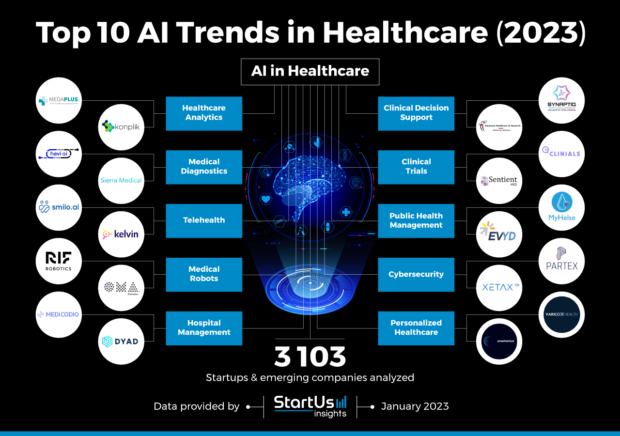The healthcare industry is undergoing a significant transformation, fueled by the advancement of Artificial Intelligence (AI) technologies. AI-powered automation is revolutionizing healthcare operations, enhancing patient care, and improving operational efficiency. As we approach 2025, AI in healthcare automation is poised to be one of the most impactful trends shaping the future of the industry. This article explores the various ways AI is being used in healthcare automation, its benefits, challenges, and the opportunities it presents for businesses in the healthcare sector.
In the realm of healthcare, the need for innovation is more pressing than ever. As the global population continues to grow, healthcare providers are under increasing pressure to deliver quality care while managing costs and improving outcomes. Automation, powered by AI, offers a solution to many of these challenges. Through the use of machine learning algorithms, natural language processing (NLP), and predictive analytics, healthcare systems can streamline operations, enhance decision-making, and provide personalized care to patients.
AI has already made significant inroads into various healthcare functions, from administrative tasks to clinical decision-making. By automating routine tasks such as appointment scheduling, data entry, and billing, healthcare organizations can free up resources to focus on patient care. Furthermore, AI-driven systems can analyze vast amounts of medical data, identify patterns, and assist healthcare professionals in diagnosing and treating patients more accurately and efficiently.
One of the key areas where AI is making a difference is in the automation of administrative processes. Tasks that were once time-consuming and error-prone, such as patient scheduling, claims processing, and medical record management, are now being automated with AI-powered solutions. This has led to significant improvements in operational efficiency and reduced administrative costs, enabling healthcare organizations to allocate more resources to patient care. For instance, AI in business operations has allowed many healthcare providers to streamline back-office functions, resulting in faster claim approvals and smoother patient onboarding processes.
In addition to administrative tasks, AI is also transforming patient care. Through predictive analytics, AI-powered systems can analyze patient data, identify trends, and provide healthcare providers with insights that enable more personalized and proactive care. This has led to significant improvements in the early detection of diseases, such as cancer and heart disease, and has enabled healthcare professionals to make more accurate diagnoses. AI technologies tools are helping doctors and nurses identify at-risk patients earlier, allowing for more effective treatments and improved outcomes.
As we look to the future of healthcare automation in 2025, the potential of AI to improve healthcare delivery is even greater. The integration of AI with wearable health devices, telemedicine platforms, and electronic health records (EHR) systems will further enhance patient care and operational efficiency. AI-powered chatbots and virtual assistants will become more advanced, enabling patients to access medical advice and schedule appointments with ease, 24/7. These advancements will not only improve the patient experience but also reduce the burden on healthcare professionals, allowing them to focus on more complex tasks.

Applications of AI in Healthcare Automation
- AI-Powered Diagnostic Tools
One of the most promising applications of AI in healthcare is its ability to assist in diagnosing diseases. AI-powered diagnostic tools, such as imaging analysis software, can analyze medical images, such as X-rays, MRIs, and CT scans, to detect abnormalities and assist doctors in making faster and more accurate diagnoses. These tools use machine learning algorithms to identify patterns in medical images that may be invisible to the human eye, significantly improving diagnostic accuracy.
In 2025, we expect to see even more advanced AI diagnostic tools that can analyze a wider range of medical data, including genetic information, patient history, and real-time data from wearable devices. This will enable doctors to make more informed decisions and provide personalized treatment plans based on each patient’s unique health profile.
- Robotic Surgery
Robotic surgery is another area where AI is making a significant impact. AI-powered robotic systems are already being used in various surgical procedures, such as minimally invasive surgeries, where precision and control are critical. These robotic systems can assist surgeons by providing real-time data, enhancing their precision, and reducing the risk of human error. In 2025, it is expected that robotic surgery will become even more advanced, with AI-driven systems capable of performing more complex procedures with greater accuracy.
AI in healthcare automation also plays a vital role in improving surgical outcomes by providing surgeons with real-time insights and recommendations based on data analysis. This will enable healthcare professionals to make faster and more accurate decisions during surgeries, reducing recovery times for patients and improving overall outcomes.
- AI-Powered Virtual Health Assistants
Virtual health assistants, powered by AI, are becoming an increasingly popular tool in healthcare automation. These virtual assistants can provide patients with personalized health advice, answer medical questions, and help them manage their health conditions. In 2025, AI-powered virtual assistants are expected to become even more advanced, offering highly personalized care based on individual health data.
For example, AI-powered virtual assistants can analyze a patient’s medical history, monitor their health through wearable devices, and provide recommendations on lifestyle changes, medication adherence, and symptom management. These virtual assistants can also help with administrative tasks, such as scheduling appointments and sending reminders for follow-up care.
In addition to improving patient care, AI-powered virtual assistants can reduce the administrative burden on healthcare professionals. By automating routine tasks such as answering common medical questions and scheduling appointments, healthcare providers can focus on more complex and critical aspects of patient care.
- Predictive Analytics for Disease Prevention
One of the most exciting applications of AI in healthcare automation is its ability to predict and prevent diseases. AI-powered predictive analytics tools can analyze vast amounts of patient data to identify patterns and predict the likelihood of certain health conditions. By analyzing factors such as age, lifestyle, medical history, and genetic information, AI can provide healthcare professionals with early warning signs of diseases such as diabetes, heart disease, and cancer.
In 2025, predictive analytics tools will become even more advanced, enabling healthcare providers to offer personalized prevention plans for patients based on their individual risk factors. This will not only improve patient outcomes but also reduce healthcare costs by preventing the onset of chronic conditions before they require expensive treatments.
- AI in Health Data Management
Efficient management of health data is a critical challenge for healthcare organizations. With the increasing amount of data being generated by electronic health records (EHRs), wearable devices, and telemedicine platforms, it is becoming increasingly difficult for healthcare providers to manage and analyze this data manually. AI-powered systems can help automate the management of health data, making it easier for healthcare providers to access and analyze patient information.
AI-driven systems can automatically categorize and organize health data, allowing healthcare providers to access the information they need more quickly and easily. In addition, AI technologies tools can assist in identifying patterns and trends in patient data, providing healthcare professionals with valuable insights that can improve patient care.
Challenges of AI in Healthcare Automation
While AI holds tremendous potential for healthcare automation, there are several challenges that must be addressed before its widespread adoption. One of the biggest challenges is the need for high-quality data. AI algorithms require large volumes of accurate and diverse data to train effectively. In healthcare, this means that AI systems need access to comprehensive patient data, including medical history, diagnostic results, and treatment outcomes.
Data privacy and security are also major concerns. Healthcare organizations must ensure that patient data is protected from cyber threats and unauthorized access. As AI systems become more integrated into healthcare operations, it is essential to implement robust security measures to protect sensitive patient information.
Another challenge is the need for healthcare professionals to adapt to AI-powered tools. While AI has the potential to improve decision-making and streamline processes, it is important for healthcare providers to receive proper training and support to effectively use these technologies. Ensuring that healthcare professionals are comfortable with AI-powered systems will be crucial for the successful implementation of healthcare automation in the coming years.
The Future of AI in Healthcare Automation
Looking ahead to 2025 and beyond, the potential of AI in healthcare automation is limitless. As AI technologies continue to advance, we can expect to see more widespread adoption of AI-powered tools across all aspects of healthcare, from diagnostics and treatment to patient care and administrative tasks. The integration of AI with wearable devices, telemedicine platforms, and electronic health records will further enhance patient care and operational efficiency.
For startup ideas in healthcare, AI presents a wealth of opportunities to innovate and improve existing processes. From developing AI-powered diagnostic tools to creating personalized health solutions, entrepreneurs have the chance to make a significant impact on the future of healthcare. AI and automation in healthcare will continue to evolve, offering new ways to improve outcomes, reduce costs, and enhance the overall patient experience.
In conclusion, AI-powered healthcare automation is set to revolutionize the industry by improving operational efficiency, enhancing patient care, and providing healthcare professionals with powerful tools to make informed decisions. As AI technologies continue to evolve, the future of healthcare automation in 2025 looks incredibly promising, with endless possibilities for improving patient outcomes and transforming the way healthcare is delivered. By embracing AI-driven solutions, healthcare organizations can stay at the forefront of innovation and provide the best care possible for their patients.

